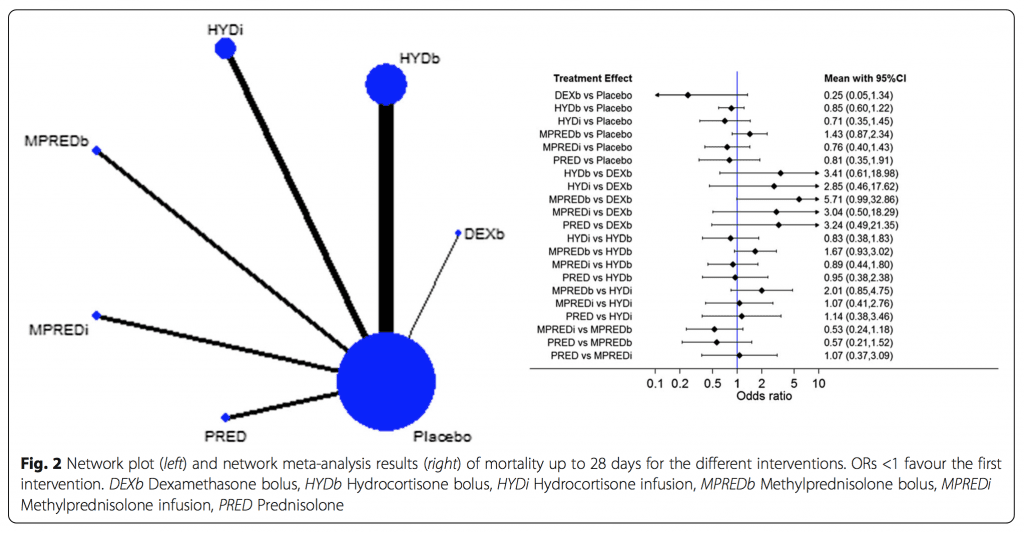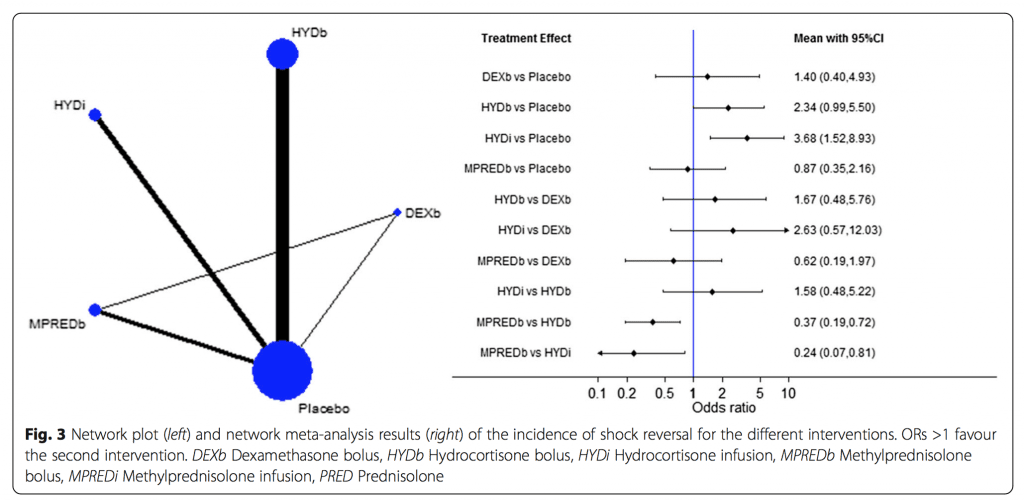
 Background: A Cochrane review was published in 2015 evaluating 33 trials with 4,268 participants to evaluate the effects of corticosteroids on death at one month in patients with sepsis. In that meta-analysis the authors concluded that despite the overall low quality of evidence, corticosteroids still reduced mortality among patients with sepsis. Corticosteroids in sepsis/septic shock has been a controversial topic as the exact dose, which steroid to use, which patients will benefit and when to start them have all been debated.
Background: A Cochrane review was published in 2015 evaluating 33 trials with 4,268 participants to evaluate the effects of corticosteroids on death at one month in patients with sepsis. In that meta-analysis the authors concluded that despite the overall low quality of evidence, corticosteroids still reduced mortality among patients with sepsis. Corticosteroids in sepsis/septic shock has been a controversial topic as the exact dose, which steroid to use, which patients will benefit and when to start them have all been debated.
What They Did:
- Network meta-analysis from 22 studies and 1 study with partial data from the recent 2015 Cochrane Review
- Interventions assessed included:
- Hydrocortisone infusion
- Hydrocortisone bolus
- Dexamethasone bolus
- Methylprednisolone bolus
- Methylprednisolone infusion
- Prednisolone
Outcomes:
- Up to 28-day mortality
- Hospital mortality
- Intensive care unit (ICU) length of stay (LoS)
- ICU mortality
- Shock reversal
- Incidence of gastrointestinal (GI) bleeding
- Incidence of superinfections
Inclusion:
- Randomized Controlled Trials with and without blinding
- Adults with sepsis
- Interventions with systemic corticosteroid vs “standard therapy”/placebo
Exclusion:
- Studies in children (<18years) – 2 ½ studies out of 33
- Studies investigating effect of corticosteroids on respiratory function in ARDS and pneumonia – 5 studies out of 33
- Cross-over studies where both groups received steroids and no info published on outcomes at cross-over – 2 out of 33 studies
Key Results:
Mortality up to Day 28:
- Some Evidence that: Methylprednisolone boluses increase risk of mortality compared with Dexamethasone boluses (OR 5.71, 95% CI 0.99 – 32.9)
- Weak Evidence that: Dexamethasone boluses decrease risk of mortality compared with placebo (OR 0.25, 95% CI 0.05 – 1.34)

Shock Reversal:
- Strong Evidence that: Methylpredinisolone boluses less likely to result in shock reversal compared to Hydrocortisone Boluses (OR 0.37, 95% CI 0.19 – 0.72)
- Strong Evidence that Methylprednisolone boluses less likely to result in shock reversal compared to Hydrocortisone Infusions (OR 0.24, 95% CI 0.07 – 0.72)
- Some Evidence that: Hydrocortisone boluses increases likelihood of shock reversal when compared to placebo (OR 2.34, 95% CI 0.99 – 5.50)
- Some Evidence that: Hydrocortisone Infusions increases likelihood of shock reversal when compared to placebo (OR 3.68, 95% CI 0.10 – 0.99)

Superinfections:
- Weak evidence that: Dexamethasone may increase risk of super infections compared with placebo (OR 2.78, 95% CI 0.73 – 10.6)
- Some evidence that: Methylprednisolone boluses and infusions may reduce the risk of super infections compared with boluses of dexamethasone (OR 0.32, 95% CI 0.09 – 1.19) and (OR 0.23, 95% CI 0.05 – 1.08) respectively
Strengths:
- Assessment for risk of bias was carried out using the Cochrane Handbook for Systematic Reviews of Interventions
- Used the structured approach of Cochrane review
- Network meta-analysis allows for multiple pairwise comparisons and therefore helps us determine which steroid and by which administration (bolus vs infusion) method to use if we chose to use steroids
- Assessed only randomized clinical trials (22 trials with >3000 patients), which is the highest form of evidence in research
Limitations:
- In the studies included there were few studies comparing treatment regimens. 20 of the 22 studies were comparisons against placebo.
- Studies included were from the past 50 years, which limits generalizability as there have been advancements made in the past few years in sepsis treatment
- Dosing and type of corticosteroids used have changed over time as well. This review did not compare different dosing strategies of corticosteroids
- Many studies used different definitions of outcome measures making it impossible to draw conclusions in many circumstances (i.e. hyperglycemia)
Discussion:
- Hyperglycemia was seen frequently in the studies, however the definition of hyperglycemia varied so much between studies, according to the authors it was not possible to group the results for assessment
- The most current surviving sepsis campaign also recommends hydrocortisone (<400mg/d) in patients unresponsive to vasopressors for shock reversal
Author Conclusion: “There was no clear evidence that any one corticosteroid drug or treatment regimen is more likely to be effective in reducing mortality or reducing the incidence of gastrointestinal bleeding or superinfection in septic shock. Hydrocortisone delivered as a bolus or as an infusion was more likely than placebo and methylprednisolone to result in shock reversal.”
Clinical Take Home Point: A review of RCTs using glucocorticoids in septic shock show that low-dose hydrocortisone improves shock reversal, but this does not translate into improved mortality outcomes.
Stay Tuned:
The results of the ADRENAL trial are going to be released soon.
- Adjunctive corticosteroid treatment iN critically ilL Patients with Septic Shock (ADRENAL)
- Multicenter, randomized, blinded, placebo controlled trial
- Study will include 3800 intensive care patients with septic shock
- Patients will be randomized to IV hydrocortisone 200mg or placebo daily for 7 days as a continuous IV infusion while in the ICU
- Study aims to answer whether adult patients admitted to the Intensive Care Unit with septic shock who are given hydrocortisone compared to placebo, will have improved mortality at 90 days or later.
- The results of this trial will be released at the Critical Care Reviews Meeting 2018 in Titanic, Belfast Friday Jan 19th from 9a – 11am GMT which is 3a – 5a Jan 19th CST
- Link to meeting website and livestream link is HERE
References:
- Gibbison B et al. Corticosteroids in Septic Shock: A systematic Review and Network Meta-Analysis. Crit Care 2017. PMID: 28351429
- Annane D et al. Corticosteroids for Treating Sepsis. Cochrane Database Syst Rev. 2015. PMID: 26633262
For More Thoughts on This Topic Checkout:
- Scott Weingart at EMCrit: Steroids for Septic shock – PRE-ADRENAL
- Steve Mathieu at The Bottom Line: Steroids in Septic Shock
- Josh Farkas at PulmCrit (EMCrit): Steroids in Septic Shock – Four Misconceptions and One Truth
Post Peer Reviewed By: Anand Swaminathan (Twitter: @EMSwami)
The post Should we Pump up the Juice (Steroids) in Septic Shock? appeared first on REBEL EM - Emergency Medicine Blog.
